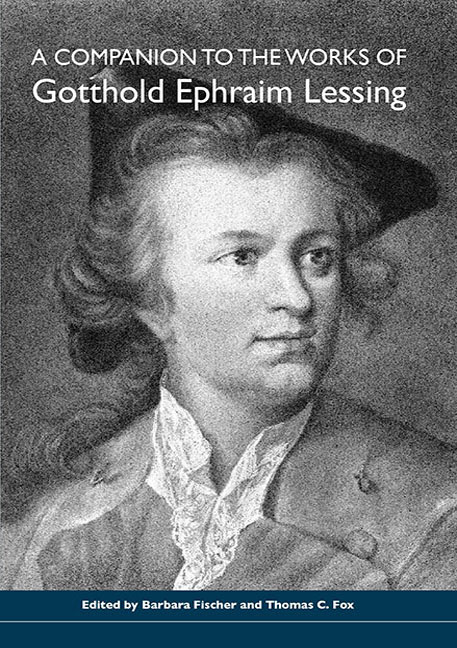Book contents
- Frontmatter
- Contents
- List of Illustrations
- Acknowledgments
- Lessing Editions and Abbreviations
- Selected Works by Lessing
- Introduction
- Lessing's Life, Work, and Times
- Criticism and Aesthetics
- Philosophy and Theology
- Drama and Drama Theory
- Reception
- Contact Organizations
- The Lessing Museum and Research Center for Lessing Reception in Kamenz
- The Lessing Academy in Wolfenbüttel
- A Brief History of the Lessing Society
- Works Cited
- Notes on the Contributors
- Index
The Lessing Academy in Wolfenbüttel
from Contact Organizations
Published online by Cambridge University Press: 28 April 2017
- Frontmatter
- Contents
- List of Illustrations
- Acknowledgments
- Lessing Editions and Abbreviations
- Selected Works by Lessing
- Introduction
- Lessing's Life, Work, and Times
- Criticism and Aesthetics
- Philosophy and Theology
- Drama and Drama Theory
- Reception
- Contact Organizations
- The Lessing Museum and Research Center for Lessing Reception in Kamenz
- The Lessing Academy in Wolfenbüttel
- A Brief History of the Lessing Society
- Works Cited
- Notes on the Contributors
- Index
Summary
Executive Director, Lessing Academy, Wolfenbüttel
There are two german cities that take particular pride in their affiliation with Lessing: Kamenz, where the poet was born, and Wolfenbüttel, where he spent his final years. At that time, Wolfenbüttel was a small and uninteresting town, particularly after the ducal court had been moved to Braunschweig. However, in Wolfenbüttel Lessing not only wrote Emilia Galotti, Nathan der Weise and Die Erziehung des Menschengeschlechts, but he also worked there as the ducal librarian for over ten years. This aspect of his career is rarely dealt with, let alone appreciated.
It was probably due to the genius loci of the Wolfenbüttel library that in 1971 an institution was founded which devotes itself to Lessing and the Enlightenment: the Lessing-Akademie. Among the founding members were Dr. Max Plaut (the Academy's first president), Professor Paul Raabe (then director of the Herzog August Bibliothek), the theologian Professor Karl Heinrich Rengstorf, Dr. Günter Schulz (for a long time secretary-general of the Academy) and Ernst August Schütze, the mayor of Wolfenbüttel at that time. One may ask if this institution should be called an “academy”; Lessing himself did not get on too well with academies, and some people might feel intimidated by the high standard the term implies. In fact, every person who is interested in the work of the Lessing Academy and in the Enlightenment may join. The Academy is a non-profit organization, with statutes, a president, a treasurer, and an executive committee.
The Academy devotes itself to the work and the influence of Lessing. But it also deals with questions vital to ideals of the Enlightenment: liberty and impartial justice, humanity and tolerance, and communication among peoples. The social and cultural history of the German Jews is an important concern of the Academy. The Academy is supported by the state of Lower Saxony, the city of Wolfenbüttel, and regional government. A small, but nonetheless important part of its budget comes from its members. (Dues are 30 Euros per year, 15 Euros for the unemployed and students). The budget of the Lessing Academy is small; it is just about sufficient to maintain the office (two part-time employees and — as often as possible — a temporary assistant).
- Type
- Chapter
- Information
- A Companion to the Works of Gotthold Ephraim Lessing , pp. 357 - 358Publisher: Boydell & BrewerPrint publication year: 2005



